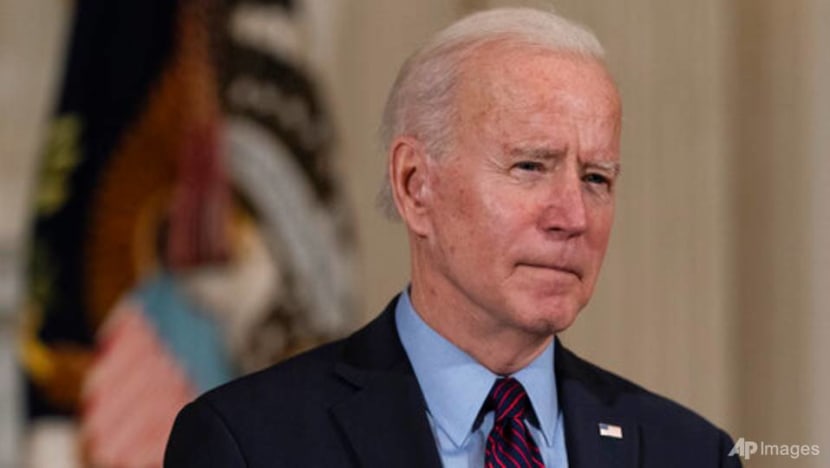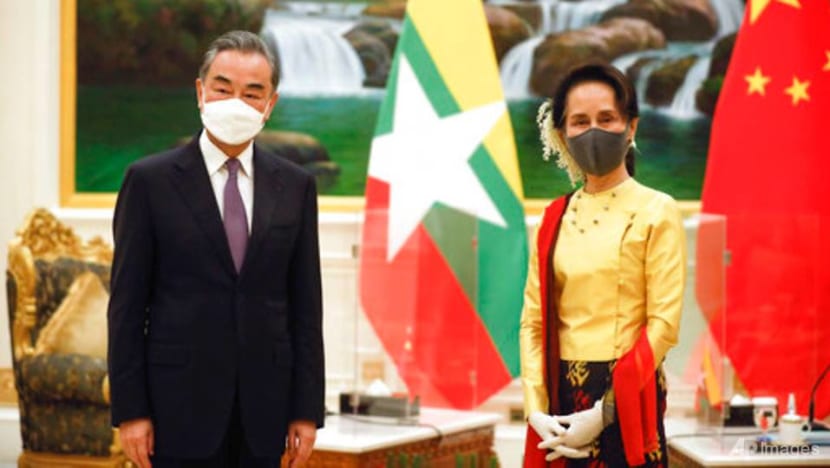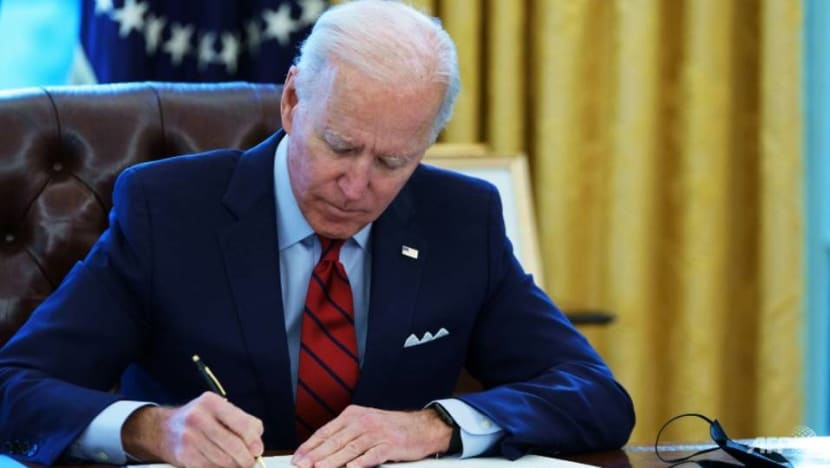commentary Commentary
Commentary: Myanmar coup poses first foreign policy test for Biden on Southeast Asia
China’s practical stance stands in contrast to Joe Biden’s focus on democratic values and push for sanctions which could alienate Asian countries, says Dr Nehginpao Kipgen.

President Joe Biden speaks about the economy in the State Dinning Room of the White House, Friday, Feb. 5, 2021, in Washington. (Photo: AP/Alex Brandon)
NEW DELHI: The Myanmar military coup that took the world by surprise has created headaches for countries figuring out a response that best safeguards their national interest.
But in short, we should expect a repeat of the international community’s approach during the years of the junta’s rule, ranging from sanctions to constructive engagement.
The United Nations is a case in point. After an emergency meeting on Feb 2 failing to agree on a text condemning the military coup, the UN Security Council hemmed and hawed until Thursday (Feb 4).
Its eventual statement expressing a vague level of deep concern and calling for the release of State Counselor Aung San Suu Kyi and President Win Myint, without mentioning the coup, was a product of compromise, pushed for by China, backed by Russia, which rejected an initially more aggressive British draft.
Unfortunately, what transpired is likely to be the norm in the coming weeks and months, for as long as the military regime remains in place.
Most countries recognise they have little sway on what happens next in Myanmar – though perhaps this is true for some more than others.
CHINA’S PRACTICAL INTERESTS
Chinese Foreign Affairs Minister Wang Yi had warned the international community must prioritise Myanmar’s political and social stability, and avoid escalating the conflict or complicating the situation, prior to the security council's Thursday’s statement.
READ: Commentary - Myanmar military never had any intention of giving up power
Supporting this stance is Chinese media Xinhua news agency’s downplaying of the significance of the coup, referring to it as a “major cabinet reshuffle” which has earned the country rebuke online.
But the calculations underpinning the overall Chinese response to Myanmar has been more complex than a superficial reading suggests.
Most observers would say Beijing’s standing up to defend the Myanmar military’s action is in line with precedence. After all, China had vetoed a UN Security Coucil resolution in August 2007 condemning Myanmar in the aftermath of a violent crackdown on anti-government protestors quickly joined by Buddhist monks. But even that move came at a cost to China’s international reputation in the lead-up to the high-stakes Beijing Olympics.
Many say Chinese authorities have a stronger affinity with the military government and wish for a return to those years when China was Myanmar’s chief patron state.
But for Beijing, it matters less which party is in power in Myanmar.

Many initially thought that Aung San Suu Kyi, a long-time human rights and democracy advocate, would forge closer ties with Western democracies and distance herself from Beijing, which shielded the military leaders who placed her under house arrest for more than a decade.
Instead, she signed the China-Myanmar Economic Corridor agreement, under the Belt and Road Initiative framework, demarcating a special economic zone and deep-water port in the area.
She visited China in 2015, where she met President Xi Jinping prior to the election.
The NLD also continued to cultivate relations with Beijing, particularly after coming under international condemnation for the Rohingya crisis.
Indeed, Myanmar’s gaze away from China and towards the US preceded Aung San Suu Kyi’s political ascend to power after the 2015 election. It was former President Thein Sein in 2012 who hosted Barack Obama’s visit to Myanmar, the first for a sitting US president, and visited the White House in 2013.
If anything, China’s stance has been consistent and principled: That developments within Myanmar are internal matters, with sanctions exerting undue international pressure tantamount to interference in domestic issues.
READ: Commentary: Why a military coup cannot be the solution in Myanmar
This position may have indeed been driven by China’s longstanding, vested interest in the stability of Myanmar. It shares a common land border and has huge economic interest in the country, being its top investor.
WHITHER THE US?
The timing of Myanmar’s coup could not be more unfortunate for the US, as the first foreign policy test on Southeast Asia for newly inaugurated Joe Biden.
The US response thus far seem to be overcompensating for something. Since Monday, the US has led international condemnation of Myanmar, with G7 countries calling for the release of detained NLD leaders and a return to democracy.
Mr Biden has proclaimed he would “stand up for democracy wherever it is under attack.” His administration has threatened the imposition of further targeted sanctions against individuals and entities controlled by the military.

This stance could have been motivated by domestic politics considerations. At a time when Biden’s administration must work with Congress on a host of ambitious, contentious first 100-days initiatives, a tough response on Myanmar’s coup has emerged as a policy that enjoys bipartisan support.
Yet what action could Biden take that would move the needle on this issue? Some symbolic US sanctions banning entry into the US for top Myanmar generals are already in place following the Rohingya crisis.
US assistance to Myanmar has also been curbed under Donald Trump, after the US foreign policy establishment had to contend with accusations that the country had given too many bargaining chips away under Obama, including the loosening up of restrictions on US investments.
More importantly, what does Mr Biden hope to achieve? And can he do so without this renewed emphasis on democracy and human rights potentially alienating Myanmar and other Asian countries, pushing them closer to China?
READ: Commentary: ASEAN can do better on Myanmar this time
The US and its allies may understand these sanctions to be symbolic in their aim, in sending a message of support for the NLD and Myanmar’s fledgling democracy, rather than as a tool to achieve a reversion to the status quo before the coup, but are these sentiments shared by Asian countries who focus on the painful effects of such sanctions?
Following the US’ demarche of ASEAN ambassadors on Thursday, some think the US is now looking like a less-than-reliable partner, where strategic relations and past goodwill built up seem to have taken a backseat to the promotion of democratic values.
CHINA NOT ALONE
China knows its stance is widely shared by many countries, particularly the Southeast Asian nations within ASEAN, whose charter is premised on the principle of non-interference in the internal affairs of countries, and of which Myanmar is a member state.
Malaysia and Indonesia may have called on the ASEAN foreign ministers to discuss Myanmar’s political turmoil at a special session but other ASEAN countries are less sanguine that such discussions can lead to meaningful change.

Even Japan, a Chinese competitor for investment opportunities in Myanmar, which has been largely supportive of democratic ideals and human rights, has called for dialogue with the Myanmar military and refrained from taking a more aggressive stance.
India, once vocal about human rights in Myanmar during the late 1980s and early 1990s, has also since adopted a calibrated position to deal with whichever leaders are in power in Myanmar, seeing how important a strategic and security partner it has become for India’s Act East and the Neighbourhood First policies.
The sum of these actions suggest little coordinated approach by the international community in response to the military coup, which works to the Myanmar’s military advantage.
UN Secretary-General Antonio Guterres may be right when he said that the UN cannot guarantee Aung San Suu Kyi’s early release from house arrest.
Worse, the military may take further steps, including amending the constitution, to prevent Aung San Suu Kyi from holding office again.
READ: Internet access partially restored in Myanmar as protests grow against military coup
But the bigger impact of the coup may be its imprint on geopolitics.
It has shone the uncomfortable spotlight on US credibility, after much bluster from the Biden administration in recent days with action still not forthcoming a week after the coup, and US-China superpower competition, seeing how any strident foreign policy stick the US might apply to Myanmar may not bring about change, at a time when Asian countries are watching what both countries will do.
Dr Nehginpao Kipgen is a Political Scientist, Associate Professor and Executive Director at the Center for Southeast Asian Studies, Jindal School of International Affairs, O P Jindal Global University. He is the author of three books on Myanmar, including Democratization of Myanmar.














